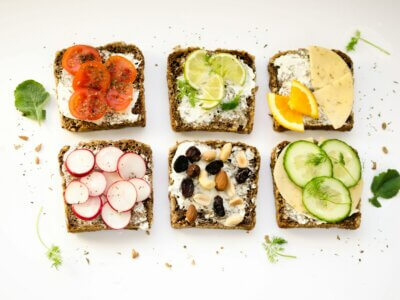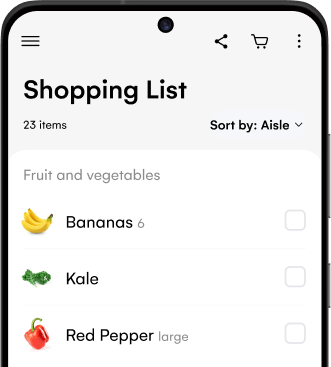There has been a lot of debate over the past few decades about natural sugars, added sugars, and whether they’re good or bad. Sugar comes in many natural forms and processed forms. It is important to understand what role sugar plays inside our bodies. Most of us know that refined sugar shouldn’t be eaten in large amounts. But fruits like bananas and pineapples have been demonized due to their high natural sugar content too.
Analyse nutritional information for any recipe

Fruit and natural sugars have been given a bad rep, but is it deserved? Or should you tuck into those grapes and oranges like there’s no tomorrow? Let’s find out the sweet truth behind this debate.

Science behind added and natural sugar
Sugar is a carbohydrate. Your body uses carbohydrates as the main source of energy. A sugar packet (which is equivalent to a teaspoon) contains 4 grams of sugar, and 16 calories. While all sugar contains the same amount of calories per gram, not all sources are created equal.
Fructose is the natural sugar found in fruit. Sugar, in its white crystallized form is a mixture of glucose and fructose and is also referred to as sucrose.
Fruit contains water, fiber, vitamins, minerals, and antioxidants alongside their sugar content. A glass of soda, for example, is just sugar in the simplest form without any of the ‘good’ parts of fruit. So if the calories are all the same, what are the differences?
The main difference is that the release of sugar is a lot slower when you eat fructose vs sucrose. High fructose corn syrup (HFCS) shouldn’t be confused with naturally occurring fructose in fruit.
For fruit’s sake
There are a ton of misconceptions surrounding fruit. If you heard that fruit is unhealthy, you’re not alone. Yes, fruit contains natural sugars. But it isn’t just sugar. Fruit it accompanied by fiber, vitamins, water, and minerals.
While fruit is a fantastic choice and definitely forms part of a healthy diet, it is best to choose it in its whole form. Frozen or fresh are both great options. It is recommended to limit the amount of fruit juice consumed. Dried fruit and freeze dried fruit are other options but when the water is removed, the fruit becomes more dense and there’s a much higher sugar content per portion. That’s why grapes, for instance, are a more nutritious choice than raisins.
Types of natural sugars
Lactose is a form of sugar which naturally occurs in milk and dairy products. If you ever look at the nutrition facts label on a milk carton, you will see around 12 grams of sugar. This comes from lactose and is natural, but isn’t doesn’t sweeten the taste.
There are many different types of natural sugars on the market these days. Honey, agave, molasses, maple syrup, and date syrup are all examples of natural sweeteners. A lot of people find comfort in consuming natural sugars over their ultra-processed counterparts. Is there any real difference? In short, not really.
There may be trace amounts of vitamins and minerals in these natural sugars. But they are virtually all the same, once broken down into our body. So if you prefer a teaspoon of sugar to the taste of honey or maple syrup, then opt for the plain sugar. As with anything, moderation is key – occasional sugar won’t harm you, but it doesn’t have health benefits and shouldn’t form a major part of your diet.
Plan ahead and say goodbye to meal time madness

The downside of sugar
Excessive consumption of sugar (even natural) can lead to fatty liver disease, elevated triglycerides, blood pressure, and dental caries. The key phrase here is ‘excessive’ though!
For example, drinking two 20oz sugar sweetened beverages every day would greatly exceed the recommendations for Americans. If you are having several servings of fruit per day, like many guidelines recommend, that is not excessive. So there’s no need to avoid your favorite fruits.
On the other hand, fructose malabsorption has been seen in individuals who are noticing uncomfortable gastrointestinal side effects from consuming foods with fructose. If you find that your body reacts badly to fruit, you might be someone who has to avoid certain types of fruit. An elimination diet may be recommended by your healthcare provider. This helps to identify which foods are causing the problem – but the likelihood is that you won’t need to avoid or eliminate all fruits.

Non-nutritive sweeteners
While a lot of people prefer sweetening their food with natural sugars, there are a ton of options for those that are watching their caloric intake. They’re popular in everything from zero-calorie sodas and soft drinks to sugar-free chocolate bars. While there are artificial sweeteners like xylitol on the market, there’s also been a recent rise in the popularity of natural sweeteners that are zero calories.
One example is stevia. It is derived from a leaf that undergoes some processing. Monk fruit extract is another natural sweetener on the market. Monk fruit itself contains glucose and fructose but the extract does not, leaving it without any calories.
The bottom line
Sugar is sugar, and it comes in many different shapes, forms, and flavors. An excessive amount of sugar may put you at risk for several medical conditions, but natural sugars in fruit are a completely healthy addition to a balanced diet. And in fact, eating a variety of fruits can help you get the vitamins and minerals your body needs. Pairing foods that contain sugar with a source of protein may help slow down the release of sugar into the body.
However, if you have a medical condition like IBS or diabetes, you may need to eliminate or limit fruit consumption. Any diet which is designed around a medical condition should be devised with the help of a medical professional.
If you are looking for recipes with less added sugars, Samsung Food app has plenty of suitable options, along with detailed nutrition information.



